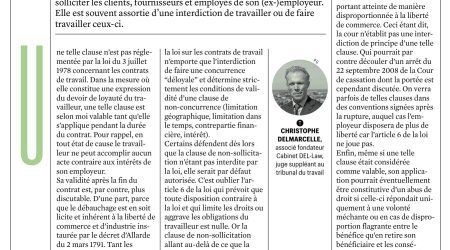Delhaize, Terminating a Company Collective Agreement, Is It Legal? What are the Consequences? (Trends 23-2-2023)
Posted the 27 February 2023Delhaize, Terminating a Company Collective Agreement, Is It Legal? What are the Consequences?
On Thursday, February 16, 2022, Delhaize announced the termination of the currently effective company collective labor agreement regulating the organization of stores, including functions, tasks, and schedules for personnel as well as the stores. According to the Delhaize spokesperson, this termination was necessary to conclude a new agreement.
An opportunity to revisit collective labor agreements in Belgian law and their termination procedures, highlighting the rather rare, if not extremely rare, nature of such termination.
A collective labor agreement can be concluded at the company level between the employer and one or more representative worker organizations, namely CSC-ACV, CGSLB-ACLVB, or FGTB-ABVV (one is sufficient), at the sectoral level, i.e., within a joint committee, or at the national level within the National Labor Council.
It is an ambivalent instrument because, while it is essentially a contract between employers and employees (represented by unions), the law attributes a special status to this agreement, as it contains so-called "normative" provisions, i.e., provisions specifying a rule intended to apply to a group of people, including non-affiliated workers of the signing organization.
The collective labor agreement must respect the hierarchy of norms in social law (the company collective labor agreement cannot contradict sectoral, national collective labor agreements, or the law and takes precedence over the individual employment contract), must contain certain mandatory clauses, and must be registered with the registry of collective labor relations of the FBS Employment.
If the collective labor agreement is concluded for a fixed term with the option of termination (which is not an obligation) or for an indefinite period, it must specify the notice period and the applicable termination procedures (for example, by registered mail taking effect within three days of sending).
If an employer wishes to modify a company collective labor agreement, especially to take into account socio-economic constraints, modify its organization, or even to reduce costs, they will generally initiate a discussion with worker representatives to agree on a new collective labor agreement replacing the old one or to record modifications in a modifying collective labor agreement.
However, if, as is probably the case with Delhaize, the desired modifications are so substantial that obtaining an agreement from worker representatives proves impossible or too costly in terms of compensation, the employer may sometimes have an interest in terminating the current collective labor agreement. At the end of the agreed notice period, it will disappear—note, however, that individual rights resulting from the collective labor agreement are incorporated into employment contracts unless the parties have derogated from this provision of the law—thus leaving the field open to completely open negotiations.
It must be said that this scenario is quite rare and is considered by both worker representatives and even by the FBS as a sign of poor consultation or very significant tensions. It is almost like an atomic bomb, laying flat the entire discussion on the working conditions covered by the terminated collective labor agreement.
However, and this highlights the contractual nature of a collective labor agreement, like any contract, it sometimes happens that terminating the old one is the only way to renegotiate freely for the future. The strategy, though aggressive, is perfectly legal.
Christophe Delmarcelle in Trends 23-2-2023
Related articles

Caution if a former colleague opposed to your employer asks you to testify in their favor

Social TV Show #1 | The Flexibility of Remuneration and Salary Transparency
